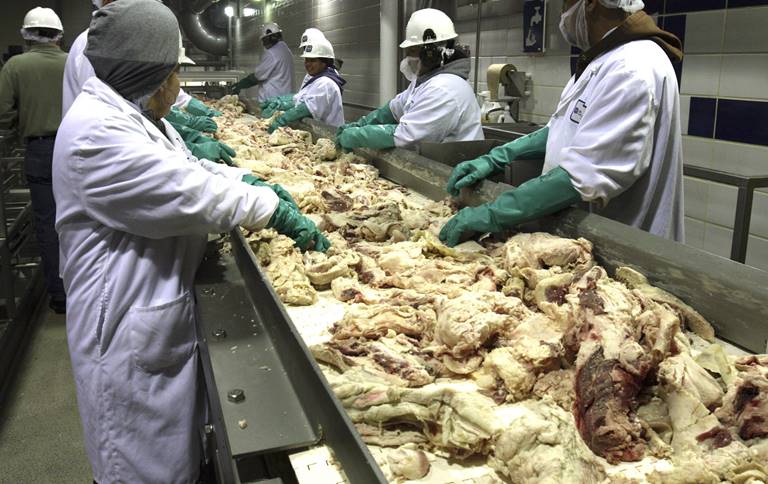American Conservative: Multinational Meat Farms Could Be Making Us Sick
Multinational Meat Farms Could Be Making Us Sick
Packing thousands of drugged-up animals in metal sheds, ignoring health concerns, makes perfect breeding grounds for pandemic.
A meat processing plant in South Sioux City, Nebraska. (Photo by Carol Guzy/The Washington Post via Getty Images)
April 21, 2020
Austin Frerick and Charlie Mitchell
In the last two weeks, there have been two coronavirus outbreaks at Smithfield Foods facilities in South Dakota and Wisconsin, with charges of cover-ups and bad handling practices. Among other issues, this exposes the inherent risk of handing control of our meat supply to the multinational agribusiness cartel. Late last year, New Jersey Senator Cory Booker introduced legislation that would fix just that.
The bill’s most important provision limits the construction of large metal sheds called concentrated animal feeding operations (CAFOs) that house at least 2,500 hogs, 1,000 beef cattle, 700 dairy cattle, 125,000 meat chickens, or 82,000 laying hens. The bill would phase out these facilities in the next 20 years. These changes are a powerful tool for revitalizing rural America, but they’re also critical for our climate, environment, and public health.
Animals used to be raised on diversified family farms with other livestock and row crops, but the popular image of Old McDonald’s farm doesn’t reflect the reality of today’s broken food system. Today, CAFOs predominate: In 2017, three-quarters of the egg-laying hens in America were owned by just 320 farms, each averaging about 900,000 birds in annual inventory and 95 percent of American hogs were raised by farms that sold 5,000 hogs in a year. (In the same time frame, independent farmers sold on average 43 hogs each.) Forty percent of the beef cattle lived out their final months of fattening in lots of 32,000 cattle or more. All of this happens in CAFOs.
These corporate farms are new, and they’ve transformed the American farm economy. Since the start of the Second Gilded Age (most would say 1980), America has lost 50 percent of its cattle farms, 80 percent of its dairies, and 90 percent of its hog farms—mostly small, independent, family operations. The replacement of family farms with CAFOs has greatly contributed to a decline in rural well-being and opportunity.
CAFOs are not farms in the traditional sense. They look and operate more like factories, with poorly paid staff doing the work. The animals spend their entire lives in a confined space, rarely seeing the light of day. They can’t naturally survive under these conditions without being pumped full of drugs, incubating resistance that poses major threats to human health. They have also been found to amplify a pandemic. Most of these operations are owned by a few huge corporations, meaning that the profits flow outside the community and, very often, outside of the country. In fact, the single largest owner and slaughterer of pigs in America is now a Chinese company called WH Group, which acquired Smithfield Foods in 2013.
Senator Booker’s proposed legislation would make a huge difference in the lives of rural Americans, whose farm economies have been decimated in recent decades by the invasion of massive corporate hog, dairy, and cattle operations. A recent survey by Johns Hopkins University’s Center for a Livable Future found that nearly two-thirds of Iowans want a moratorium on CAFOs. It’s easy to understand why. While the profits rarely stay in the community, the consequences of these operations certainly do.
For starters, there’s the smell that results from cramming so many pigs into such a small space, a suffocating odor that can drift for miles from its origin and destroys surrounding home values. An article in the Des Moines Register in November 2018 was entitled: “Why does Des Moines smell like ‘dog poo’ today?.” Manure from hog factories, of course, was to blame. Sure, all animal farms stink sometimes, but CAFOs are a special case. The environment simply cannot handle such massive populations of animals in such condensed space. The 25 million hogs in Iowa produce as much waste as 65 million humans—equivalent to the populations of Texas and California combined.
The waste is ruining America’s water. Pigs in a CAFO typically defecate into a lagoon below them. During heavy rainfall, such as the recent catastrophic flooding in Western Iowa, these lagoons overflowed into nearby creeks, causing massive environmental devastation and threatening human health and well-being. Manure is spread indiscriminately on field crops, and the result is that over half of waterways in Iowa are “impaired.” The drinking water treatment facility in the capital city of Des Moines is the most expensive of its kind ever built. A family farm with 100 hogs on it simply cannot pose a threat to its neighbors like these corporate factories.
Senator Booker’s legislation understands that rural areas are healthier in every sense when ten family farms are raising hogs, instead of one CAFO owned by a foreign corporation, staffed with poorly paid workers. CAFOs are a creation of the Second Gilded Age and put Americans at risk. It’s time to put them out to pasture.
Austin Frerick is Deputy Director at Yale University’s Thurman Arnold Project, an antitrust initiative. Charlie Mitchell is a fellow with Data For Progress.
